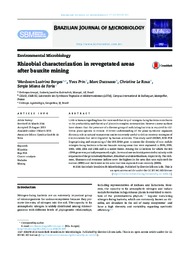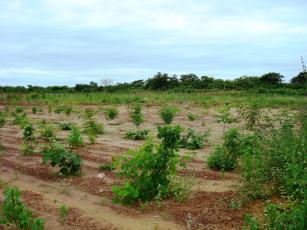Rhizobial characterization in revegetated areas after bauxite mining.
Rhizobial characterization in revegetated areas after bauxite mining.
Autoria: BORGES, W. L.; PRIN, Y.; DUCOUSSO, M.; LE ROUX, C.; FARIA, S. M. de
Resumo: Little is known regarding how the increased diversity of nitrogen-fixing bacteria contributesto the productivity and diversity of plants in complex communities. However, some authorshave shown that the presence of a diverse group of nodulating bacteria is required for dif-ferent plant species to coexist. A better understanding of the plant symbiotic organismdiversity role in natural ecosystems can be extremely useful to define recovery strategies ofenvironments that were degraded by human activities. This study used ARDRA, BOX-PCRfingerprinting and sequencing of the 16S rDNA gene to assess the diversity of root nodulenitrogen-fixing bacteria in former bauxite mining areas that were replanted in 1981, 1985,1993, 1998, 2004 and 2006 and in a native forest. Among the 12 isolates for which the 16SrDNA gene was partially sequenced, eight, three and one isolate(s) presented similarity withsequences of the genera Bradyrhizobium, Rhizobium and Mesorhizobium, respectively. The rich-ness, Shannon and evenness indices were the highest in the area that was replanted theearliest (1981) and the lowest in the area that was replanted most recently (2006).
Ano de publicação: 2016
Tipo de publicação: Artigo de periódico
Unidade: Embrapa Amapa
Palavras-chave: Fixação simbiótica de nitrogênio, Nodulação, Simbiose, Symbiotic nitrogen fixation, nodulation, symbiosis
Conteúdo relacionado
Observações
1 - Por padrão são exibidas publicações dos últimos 20 anos. Para encontrar publicações mais antigas, configure o filtro ano de publicação, colocando o ano a partir do qual você deseja encontrar publicações. O filtro está na coluna da esquerda na busca acima.
2 - Para ler algumas publicações da Embrapa (apenas as que estão em formato ePub), é necessário ter, no celular ou computador, um desses softwares gratuitos. Sistemas Android: Google Play Livros; IOS: iBooks; Windows e Linux: software Calibre.
Acesse outras publicações
Acesse a Base de Dados da Pesquisa Agropecuária (BDPA) para consultar o acervo completo das bibliotecas da Embrapa.


